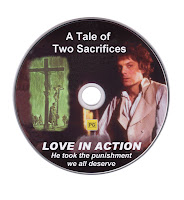 My wife and I watched an old black and white version of Charles Dickens’ "A Tale of Two Cities," and I was moved to a point of tears. The story is set during the French revolution and is about a young lawyer named Sydney Carton, who loses the woman he loves to another man. Through a series of circumstances the woman’s husband is awaiting the guillotine, and the lawyer gets into the prison, takes his place, and is executed, leaving the husband to go free and be with the one he loves.
My wife and I watched an old black and white version of Charles Dickens’ "A Tale of Two Cities," and I was moved to a point of tears. The story is set during the French revolution and is about a young lawyer named Sydney Carton, who loses the woman he loves to another man. Through a series of circumstances the woman’s husband is awaiting the guillotine, and the lawyer gets into the prison, takes his place, and is executed, leaving the husband to go free and be with the one he loves.
Sadly, the movie dropped the fact that the hero was converted to Christianity during the last few days of his life, repeating the words of Jesus, "I am the resurrection and the life." In fact, resurrection is the dominant theme of the final part of the novel, but not in the movie. The husband is rescued at the last moment and recalled to life; Carton chooses death and resurrection to a life better than that which he has ever known.
What brought me to tears was the secret plan the hero contrived--to give his life for another. Such nobility is rare among humanity. It is the ultimate gift that we can give to another. No greater love has a man than this, that he should lay down his life for this friends.
Sadly, many see the suffering death of Jesus as simply an example of how we should live. We should live and die as Jesus lived and died--sacrificially. Yet, His sinless life reveals how far we fall short of what we should be, and in His suffering He was taking the punishment that we deserve. This was something I never understood until I saw my sin in its true light. Calvary is God’s offer of mercy to guilty criminals, and that offer is meaningless until we see our guilt.
Sunday, July 27, 2008
A Tale of Two Cities
Posted by
Ray Comfort
on
7/27/2008 09:59:00 AM
![]()
A Tale of Two Cities
2008-07-27T09:59:00-07:00
Ray Comfort







